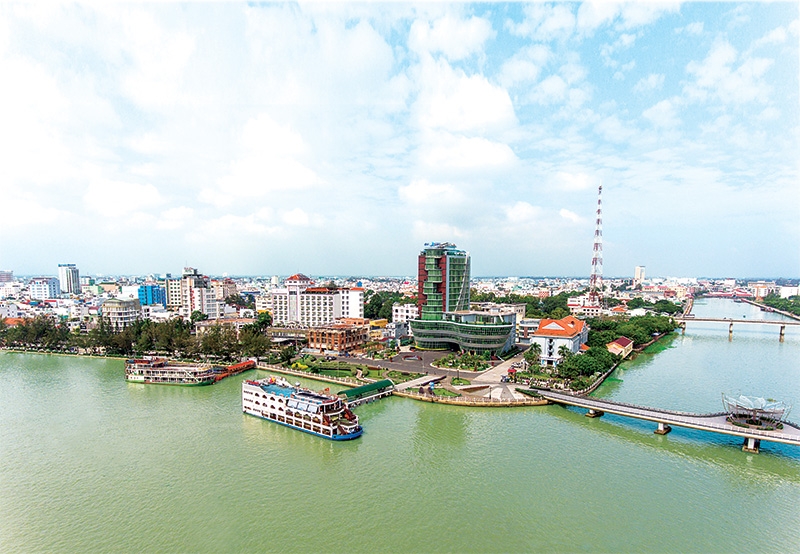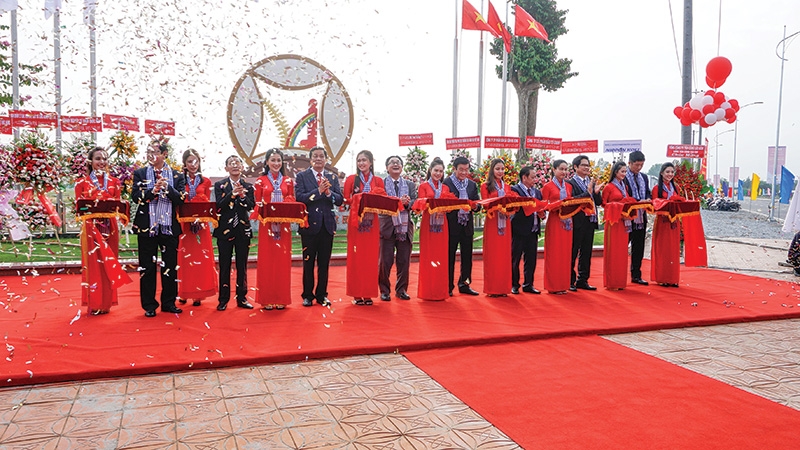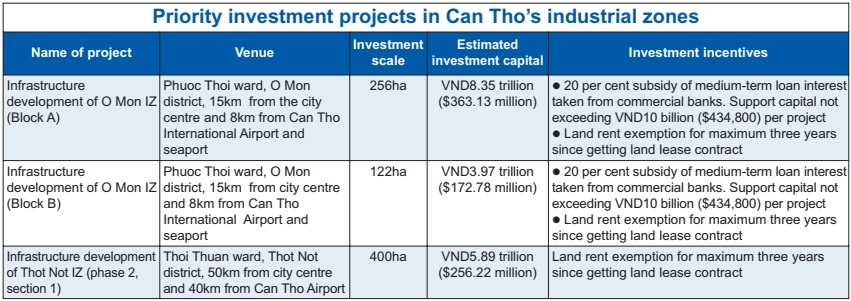Can Tho IZs hail Japanese investors
 |
Attracting Japanese investors
Can Tho’s industrial zones (IZs) are currently home to two investment projects by Japanese investors valued at $17 million in the total committed capital.
The first project, based in Tra Noc II IZ and operated by wholly Japanese-owned Tri Viet International Co., Ltd., produces sports instruments, handbags, and leather items for export and is valued at $3 million in the total registered capital.
The second project, a joint venture between Japan’s Marine Foods Corporation and local partner Nam Hai Export Foodstuff Ltd., valued at $14 million, operates in food processing for export to Japan. The plant, slated to begin official production from May 2020, received its investment certificate in March within the framework of Can Tho’s investment promotion trip to Japan.
In previous years, while many Japanese investors were keen on surveying investment opportunities in the Mekong Delta and Can Tho, they could only approach limited data via official channels.
Aware of the importance of foreign investment attraction, particularly from Japan, in recent months the city’s management authorities have been working to foster investment co-operation with Japanese partners. Late last year, Can Tho People’s Committee inaugurated the Vietnam-Japan Friendship Industrial Park (IP) in Cai Rang district’s Tan Phu ward over 42.9 hectares (30ha in phase one), with Can Tho Development Investment Fund (Cadif) acting as the developer. The IP, specially catering to Japanese investors, features seamless technical and social infrastructure satisfying green IP standards.
The Vietnam-Japan Friendship IP, with favourable transport connections by road and waterway, is strategically positioned only about five kilometres from Can Tho centre, 8km from Can Tho International Airport, and links with the international seaport system along the Hau River which is accessible to 20,000 dead-weight tonnage vessels.
Simultaneously, to support Japanese experts residing and working in Can Tho, Cadif has developed a residential township located next to the IP. The township, located in Hung Phu ward, features schools, supermarkets, and the future municipal administrative area, providing advantages to investors landing projects at the Vietnam-Japan Friendship IP.
 |
| The launch ceremony of the Vietnam-Japan Friendship Industrial Park |
Strategic position
Sitting at the heart of the Mekong Delta’s lower section on more than 1.439 square kilometres of total natural area, Can Tho enjoys a strategic position as it is 169km from Ho Chi Minh City, the southern region’s growth engine, and 60-120km distant from major urban centres in the delta region, providing favourable connections by all means of transport to locations at home and abroad.
In recent years, due to the increasing attention and support from the Vietnamese government, and the promotion of its advantages, Can Tho has developed a fairly comprehensive transport infrastructure network with many important projects put into use.
Some eminent ventures include the upgrading and expansion of Can Tho International Airport, Can Tho Bridge, Port of Cai Cui, and National Highway 91B, to name but a few. These projects have turned Can Tho into an important destination for trade exchange in the Mekong Delta region.
Significantly, travel time from Can Tho to Ho Chi Minh City is expected to be halved after the completion of the Trung Luong-My Thuan and My Thuan-Can Tho road sections which are part of the expressway connecting Ho Chi Minh City and Can Tho set to be finished by 2021.
Can Tho is also a major human resources training centre in the region. It hosts five universities, a campus of Ho Chi Minh City University of Architecture, and a network of colleges, technical high schools, and more than 60 vocational training units – altogether providing education to about 350,000 students.
With its strategic position and a complete infrastructure network, Can Tho has great potential to accelerate the local economic development, such as hi-tech agriculture, agricultural and seafood processing, tourism and related infrastructure, supporting industries, IT, urban and transport infrastructure, logistics, and finance and banking.
In past years, Can Tho has ramped up the pace of IZ infrastructure construction, making it a focus for investment attraction and socio-economic development. The city is currently home to six IZs accommodating 242 projects. About 486ha of land for industrial production have been leased out, attracting $1.73 billion in the total committed capital, $1.04 billion (60.4 per cent) of which has been disbursed.
In the first half of this year, businesses based in the city’s IZs earned $868.8 million, providing jobs to more than 31,000 local workers.
According to Nguyen Thi Kieu Duyen, deputy director of Can Tho Industrial and Export Processing Zones Authority, the city is inviting domestic and international investors, including those from Japan, to develop infrastructure facilities for three priority IZs – O Mon IZ (Block A), O Mon IZ (Block B), and Thot Not IZ (phase two).
 |
Contact address: Can Tho Industrial and Export Processing Zones Authority
Tel: 84.292.3830.773; Fax: 84.292.3830.773 ; Email: cepiza@cantho.gov.vn
What the stars mean:
★ Poor ★ ★ Promising ★★★ Good ★★★★ Very good ★★★★★ Exceptional
Related Contents
Latest News
More News
- Site clearance work launched for Dung Quat refinery upgrade (February 04, 2026 | 18:06)
- Masan High-Tech Materials reports profit: a view from Nui Phao mine (February 04, 2026 | 16:13)
- Hermes joins Long Thanh cargo terminal development (February 04, 2026 | 15:59)
- SCG enhances production and distribution in Vietnam (February 04, 2026 | 08:00)
- UNIVACCO strengthens Asia expansion with Vietnam facility (February 03, 2026 | 08:00)
- Cai Mep Ha Port project wins approval with $1.95bn investment (February 02, 2026 | 16:17)
- Repositioning Vietnam in Asia’s manufacturing race (February 02, 2026 | 16:00)
- Manufacturing growth remains solid in early 2026 (February 02, 2026 | 15:28)
- Navigating venture capital trends across the continent (February 02, 2026 | 14:00)
- Motivations to achieve high growth (February 02, 2026 | 11:00)

 Tag:
Tag:




















 Mobile Version
Mobile Version